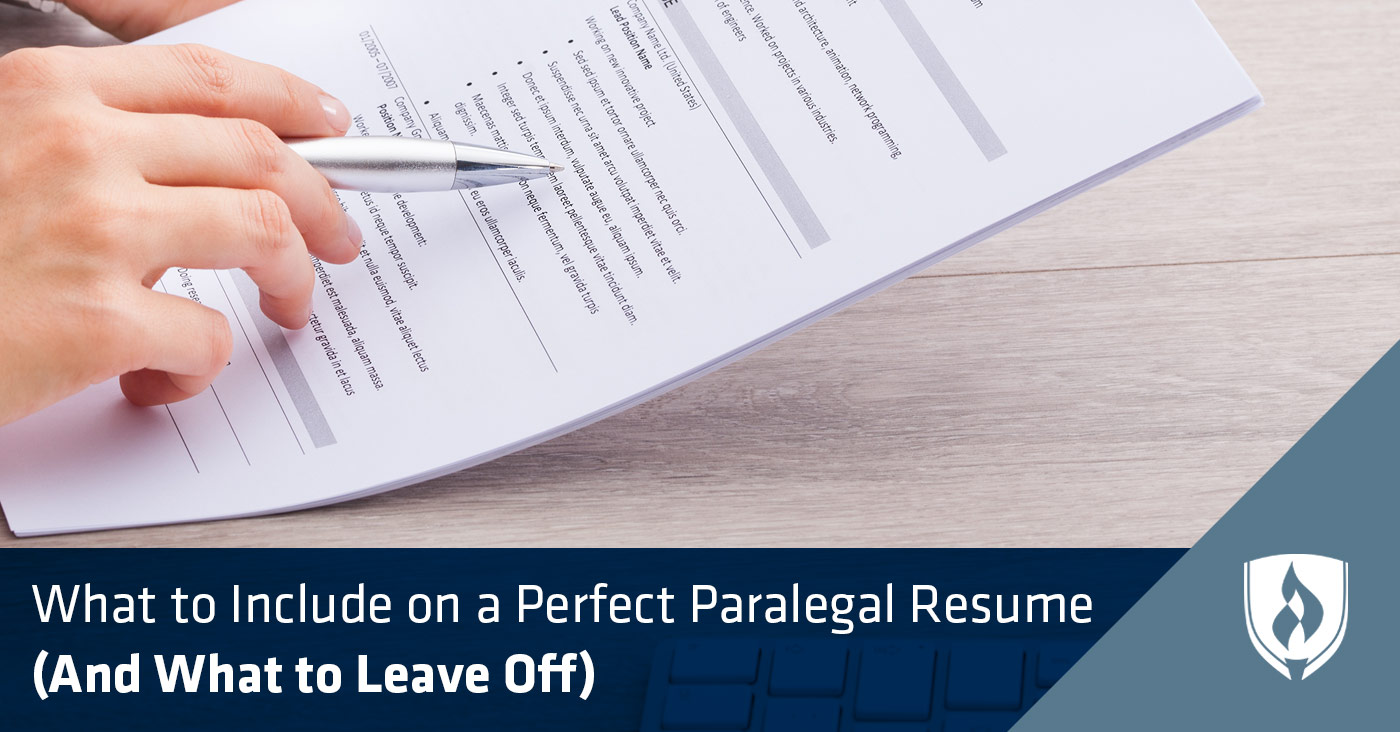What to Include on a Perfect Paralegal Resume (and What to Leave Off)
By Ashley Brooks on 03/22/2017

You went through the hard work of earning your Paralegal Associate’s degree or certificate. Now you want to make sure you craft a paralegal resume that can help you get your new career off to a roaring start.
There are several key features of a paralegal resume that can make you stand apart from other applications. “Crafted effectively, a resume can provide a critical first impression to potential employers, demonstrating you’re a strong candidate and paving the way to a face-to-face interview,” says Charles Volkert, Senior District President of Robert Half Legal.
Follow these expert tips to write a paralegal resume that could help you land the job you’ve been dreaming of.
The do’s and don’ts of a perfect paralegal resume
Not all resumes are created equal, but there are some general guidelines you can follow to make sure yours is on the right track.
“A resume should serve as a written, more comprehensive version of your elevator pitch,” Volkert says. He adds that the ideal paralegal resume includes your relevant experience, qualifications, legal knowledge and the strengths and skills you bring to the workplace.
Now that you know the basics, learn what you can do to take your resume above and beyond expectations. Follow these do’s and don’ts to craft the ideal paralegal resume.
Do . . . highlight specific results and performance
Don’t make employers guess at what you’re bringing to the table as a paralegal. Use your resume to show specific results you’ve achieved in the past so they can get an idea of what you could do for their company if they hire you.
“Potential employers are looking for the impact of your past performance as well as quantifiable contributions and accomplishments,” Volkert says. Focusing on results shows that you not only have the skills of a great paralegal, you know how to apply them in a way that adds value for an employer.
Don’t . . . make your resume too long
It’s tempting to include every job you’ve ever held and achievement you’ve ever attained, but a lengthy resume could actually work against you. “A potential employer spends very little time reviewing the materials a candidate submits,” Volkert says, “so keep your paralegal resume brief and targeted.”
A shorter, more focused resume is not only more likely to capture the attention of hiring managers, but it also shows that you’re respectful of their time.
Do . . . tailor your resume to each job
Employers don’t just want to know that you’re a qualified paralegal, they want to know that you’re the right paralegal for their team. Targeting your resume to the job you’re applying for is one way to stand out from the crowd.
“Design your resume to be as specific to the job opening as possible to help quickly attract the attention of hiring managers,” Volkert says. Using the same keywords posted in the job description will also make a great first impression. It may feel tedious to rewrite your resume for each job you apply for, but the potential to catch an employer’s eye is worth the extra time.
Don’t . . . just list past job duties
A list of job duties doesn’t do much to show potential employers why they should consider you. Instead, focus on relevant experiences, and share specifically how they apply to the position you’re interested in.
“Highlight how your experience, skills and accomplishments relate directly to the job at hand,” Volkert says. This displays that you have real-world skills in addition to education.
Do . . . include soft skills
The technical skills you learned in school are essential to your paralegal career, but that doesn’t mean you should rule out soft skills. Paralegal employers want “the whole package” from new hires, not just the usual qualifications, according to the National Association of Legal Assistants (NALA).
Which soft skills are especially appealing to employers? NALA reports that customer service, teamwork, communication, organization, adaptability and multi-tasking are soft skills that are highly desirable in the paralegal field. Past positions or job duties that highlight these skills are worth including as relevant experience. Just make sure you can make the connection back to the paralegal job you’re applying for.
Don’t . . . forget to proofread
“A poorly written resume can remove you from consideration, quickly and completely,” Volkert says. Spelling errors and other typos create a bad impression and can even cost you an interview. If you don’t care enough to check for mistakes in your own resume, employers may worry that you’ll let similar errors slip on the job. Since paralegals often need to be precise, this will count against you even more than usual.
Carefully proofread your resume before submitting it. Maybe even ask a friend to read it over or read it aloud to yourself. You should also format your resume to make it easy to read. Attention to detail is key in a paralegal job, so it’s important to demonstrate this skill in action when creating your resume.
Are you ready to launch your paralegal career?
Now that you know what to include on your paralegal resume, you’re almost ready to jump into your new career. Before you take the leap, get the scoop about what your new career will be like in our article "What I Wish I Knew BEFORE Becoming a Paralegal."
RELATED ARTICLES:




